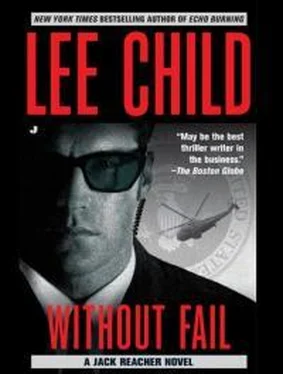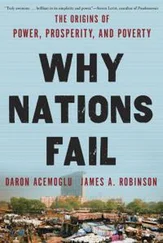Ли Чайлд - Without Fail
Здесь есть возможность читать онлайн «Ли Чайлд - Without Fail» весь текст электронной книги совершенно бесплатно (целиком полную версию без сокращений). В некоторых случаях можно слушать аудио, скачать через торрент в формате fb2 и присутствует краткое содержание. Жанр: Крутой детектив, Триллер, на английском языке. Описание произведения, (предисловие) а так же отзывы посетителей доступны на портале библиотеки ЛибКат.
- Название:Without Fail
- Автор:
- Жанр:
- Год:неизвестен
- ISBN:нет данных
- Рейтинг книги:3 / 5. Голосов: 1
-
Избранное:Добавить в избранное
- Отзывы:
-
Ваша оценка:
- 60
- 1
- 2
- 3
- 4
- 5
Without Fail: краткое содержание, описание и аннотация
Предлагаем к чтению аннотацию, описание, краткое содержание или предисловие (зависит от того, что написал сам автор книги «Without Fail»). Если вы не нашли необходимую информацию о книге — напишите в комментариях, мы постараемся отыскать её.
The secretive, closed organization that invites Jack Reacher in is the Secret Service, the organization that protects the Presidency. Someone who was once close to Reacher’s brother, needs help in her new job. Her new job? Saving the Vice President of the United States from being assassinated.
Without Fail — читать онлайн бесплатно полную книгу (весь текст) целиком
Ниже представлен текст книги, разбитый по страницам. Система сохранения места последней прочитанной страницы, позволяет с удобством читать онлайн бесплатно книгу «Without Fail», без необходимости каждый раз заново искать на чём Вы остановились. Поставьте закладку, и сможете в любой момент перейти на страницу, на которой закончили чтение.
Интервал:
Закладка:
“And they respond?”
She nodded. “They’re terrific, generally.”
“But you think this crew smuggled the letter in.”
“No other conclusion to come to.”
Reacher pointed at the screen. “So where is it now?”
“Could be in the garbage bag, in a stiff envelope. Could be in a page protector, taped underneath one of the trays or the shelves. Could be taped to the guy’s back, under his overalls.”
She hit play and the cleaners continued onward into Stuyvesant’s office. The door swung shut behind them. The camera stared forward blankly. The time counter ticked on, five minutes, seven, eight. Then the tape ran out.
“Midnight,” Froelich said.
She ejected the cassette and put the second tape in. Pressed play and the date changed to Thursday and the timer restarted at midnight exactly. It crawled onward, two minutes, four, six.
“They certainly do a thorough job,” Neagley said. “Our office cleaners would have done the whole building by now. A lick and a promise.”
“Stuyvesant likes a clean working environment,” Froelich said.
At seven minutes past midnight the door opened and the crew filed out.
“So now you figure the letter is there on the desk,” Reacher said.
Froelich nodded. The video showed the cleaners starting work around the secretarial station. They missed nothing. Everything was energetically dusted and wiped and polished. Every inch of carpet was vacuumed. Garbage was emptied into the black bag. It had bellied out to twice its size. The man looked a little disheveled by his efforts. He pushed the cart backward foot by foot and the women retreated with him. Sixteen minutes past midnight, they backed away into the gloom and left the picture still and quiet, as it had been before they came.
“That’s it,” Froelich said. “Nothing more for the next five hours and forty-four minutes. Then we change tapes again and find nothing at all from six A.M. until eight, when the secretary comes in, and then it goes down exactly as she and Stuyvesant claimed it did.”
“As one might expect,” said a voice from the door. “I think our word can be trusted. After all, I’ve been in government service for twenty-five years, and my secretary even longer than that, I believe.”
5
The guy at the door was Stuyvesant, no doubt about that. Reacher recognized him from his appearance on the tape. He was tall, broad-shouldered, over fifty, still in reasonable shape. A handsome face, tired eyes. He was wearing a suit and a tie, on a Sunday. Froelich was looking at him, worried. But he in turn was staring straight at Neagley.
“You’re the woman on the video,” he said. “In the ballroom, Thursday night.”
He was clearly thinking hard. Running conclusions through his head and then nodding imperceptibly to himself whenever they made sense. After a moment he moved his gaze from Neagley to Reacher and stepped right into the room.
“And you’re Joe Reacher’s brother,” he said. “You look just like him.”
Reacher nodded.
“Jack Reacher,” he said, and offered his hand.
Stuyvesant took it.
“I’m sorry for your loss,” he said. “Five years late, I know, but the Treasury Department still remembers your brother with affection.”
Reacher nodded again.
“This is Frances Neagley,” he said.
“Reacher brought her in to help with the audit,” Froelich said.
Stuyvesant smiled a brief smile.
“I gathered that,” he said. “Smart move. What were the results?”
The office went quiet.
“I apologize if I offended you, sir,” Froelich said. “You know, before. Talking about the tape like that. I was just explaining the situation.”
“What were the audit results?” Stuyvesant asked again.
She said nothing back.
“That bad?” Stuyvesant said to her. “Well, I certainly hope so. I knew Joe Reacher too. Not as well as you did, but we came into contact, time to time. He was impressive. I’m assuming his brother is at least half as smart. Ms. Neagley, probably smarter still. In which case they must have found ways through. Am I right?”
“Three definites,” Froelich said.
Stuyvesant nodded.
“The ballroom, obviously,” he said. “Probably the family house and that damn outdoors event in Bismarck too. Am I right?”
“Yes,” Froelich said.
“Extreme levels of performance,” Neagley said. “Unlikely to be duplicated.”
Stuyvesant held up his hand and cut her off.
“Let’s go to the conference room,” he said. “I want to talk about baseball.”
He led them through narrow winding corridors to a relatively spacious room in the heart of the complex. It had a long table in it with ten chairs, five to a side. No windows. The same gray synthetic carpet underfoot and the same white acoustic tile overhead. The same bright halogen light. There was a low cabinet against one wall. It had closed doors and three telephones on it. Two were white and one was red. Stuyvesant sat down and waved to the chairs on the other side of the table. Reacher glanced at a huge notice board full of memos labeled confidential .
“I’m going to be uncharacteristically frank,” Stuyvesant said. “Just temporarily, you understand, because I think we owe you an explanation, and because Froelich involved you with my initial approval, and because Joe Reacher’s brother is family, so to speak, and therefore his colleague is too.”
“We worked together in the military,” Neagley said.
Stuyvesant nodded, like that was an inference he had drawn long ago.
“Let’s talk about baseball,” he said. “You follow the game?”
They all waited.
“The Washington Senators had already gone when I hit town,” he said. “So I’ve had to make do with the Baltimore Orioles, which has been a mixed bag in terms of fun. But do you understand what’s unique about the game?”
“The length of the season,” Reacher said. “The win percentages.”
Stuyvesant smiled, like he was conferring praise.
“Maybe you’re better than half as smart,” he said. “The thing about baseball is that the regular season is one hundred sixty-two games long. Way, way longer than any other sport. Any other sport has about half as many games as baseball. Basketball, hockey, football, soccer, anything. Any other sport, the players can start out thinking they can win every single game all season long. It’s just about a realistic motivational goal. It’s even been achieved, here and there, now and then. But it’s impossible in baseball. The very best teams, the greatest champions, they all lose around a third of their games. They lose fifty or sixty times a year, at least. Imagine what that feels like, from a psychological perspective. You’re a superb athlete, you’re fanatically competitive, but you know for sure you’re going to lose repeatedly. You have to make mental adjustments, or you couldn’t cope with it. And presidential protection is exactly the same thing. That’s my point. We can’t win every day. So we get used to it.”
“You only lost once,” Neagley said. “Back in 1963.”
“No,” Stuyvesant said. “We lose repeatedly. But not every loss is significant. Just like baseball. Not every hit they get produces a run against you, not every defeat they inflict loses you the World Series. And with us, not every mistake kills our guy.”
“So what are you saying?” Neagley asked.
Stuyvesant sat forward. “I’m saying despite what your audit might have revealed you should still have considerable faith in us. Not every error costs us a run. Now, I completely understand that kind of so-what self-confidence must seem very offhand to an outsider. But you must understand we’re forced to think that way. Your audit showed up a few holes, and what we have to do now is judge whether it’s possible to fill them. Whether it’s reasonable . I’m going to leave that to Froelich’s own judgment. It’s her show. But what I’m suggesting is that you get rid of any sense of doubt you’re feeling about us. As private citizens. Any sense of our failure. Because we’re not failing. There are always going to be holes. Part of the job. This is a democracy. Get used to it.”
Читать дальшеИнтервал:
Закладка:
Похожие книги на «Without Fail»
Представляем Вашему вниманию похожие книги на «Without Fail» списком для выбора. Мы отобрали схожую по названию и смыслу литературу в надежде предоставить читателям больше вариантов отыскать новые, интересные, ещё непрочитанные произведения.
Обсуждение, отзывы о книге «Without Fail» и просто собственные мнения читателей. Оставьте ваши комментарии, напишите, что Вы думаете о произведении, его смысле или главных героях. Укажите что конкретно понравилось, а что нет, и почему Вы так считаете.











